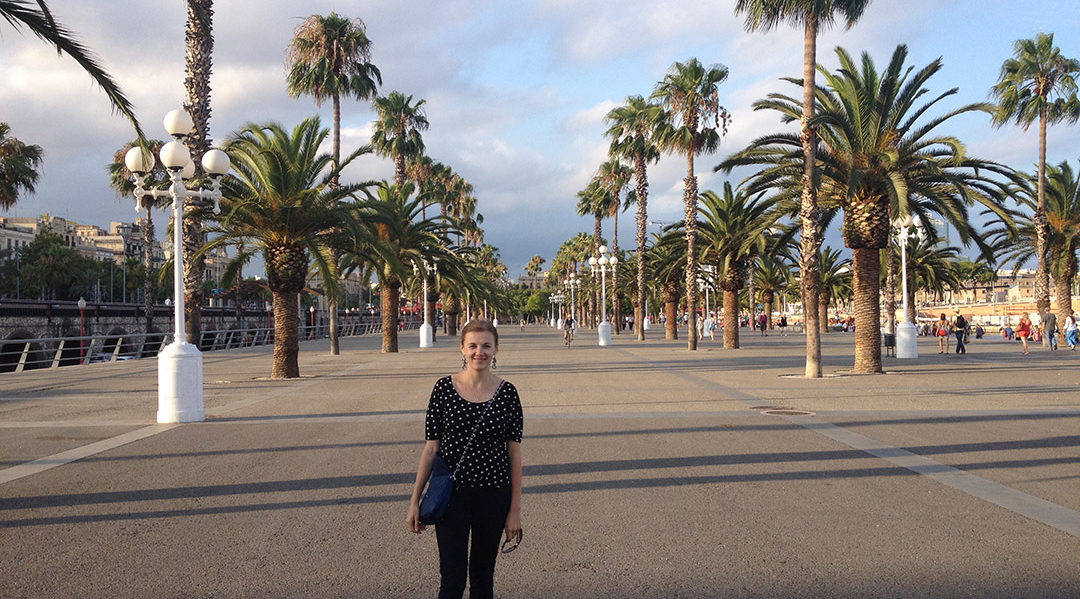
Penn State World Campus has recently brought on two new graduate assistants to support student engagement programming and co-curricular learning. We recently shared Chris’ thoughts and found time to catch up with Kate, interviewed below. We discussed her international background, what projects she’ll be working on, and why getting to know your student peers can be valuable.
Tell us a little bit about yourself — where you’re from, your educational interests, your hobbies, etc.
I am originally from Belarus, a tiny country in Eastern Europe. I moved to the United States about 16 years ago and lived most of my American life in Philly, so I consider myself a Philadelphian and proudly say “yo” whenever I can. Education is a family tradition for me; my parents are teachers of foreign languages. I was trained to be a teacher of English and German in Belarus. I also have a B.A. in English from Temple, an M.Ed in higher education administration from Harvard, and I am now working towards a dual Ph.D. degree in adult education and comparative international education. Prior to coming to Penn State, I worked in the medical field, helping run a pediatric residency program in Boston and consulting on education-related issues. I guess you can say that education is my work AND a hobby because all I ever do seems to be connected to it some way or another! I also love reading and traveling and try to go to a new place every year. This summer, I checked Saint Petersburg off my list, and I am going to Nova Scotia in October!
What excites you about being a graduate assistant for World Campus Student Affairs?
What excites me about being a part of the World Campus Student Affairs team is that I get to combine something I love and have experience doing (working with students) and something I am very interested in but have had limited exposure to (distance education). I caught the online education bug last semester when I was a teacher assistant for one of the online classes in our department. I had only taught residential classes before, and with online classes, it just felt like it was a whole new educational universe out there! Every day I am learning something new from my colleagues at World Campus because I never even imagined the range of issues they are involved in and are dealing with. I feel that so far I may have received more than I have contributed but I am working on changing that!
What will your duties entail in your role as a graduate assistant?
I will primarily be responsible for facilitating the One Lion Squad initiative. It is a unique pilot program to create peer-led learning communities for students new to World Campus with the goal of equipping them with tools necessary to succeed in their studies as well as fostering a sense of belonging to the wider Penn State community. In my role, I will be working closely with students selected to be peer leaders, helping them develop the leadership and facilitation skills necessary to deliver the One Lion Squad curriculum and be great mentors to the students in their learning communities. In addition to One Lion Squad, I am assisting in developing other co-curricular opportunities for our students.
Why do you think it’s important for students learning online to engage with their peers and with the University?
Peer engagement is an important success factor in residential education, but even more so in an online environment. Learning online can feel quite isolating because you might not really know who is in the same class with you or even who your instructor is. This can sometimes lead to having a feeling of being completely on your own or becoming demotivated to continue. You need that “support squad” to cheer you on now and again and remind you that you are not alone in this. Peer engagement is also important because peers can be an invaluable resource! Like any university, residential or online, Penn State World Campus is an enormous place and sometimes you may need help with how to complete a task or get a question answered. Having a peer network helps with that by utilizing collective wisdom and pulling everyone’s experiences and knowledge. Essentially, peer networks can help solve issues faster or at least help you head in the right direction sooner.
Anything else you’d like to share?
Having lived in Philly and Boston all my “American” life, moving to State College was an adjustment, especially because I don’t drive. I have recently bought a bike to get around, which I am half-regretting now because this area is really, really hilly! I have also just bought my first indoor plant in my life ,and my goal now is to make sure it lives through the winter. I am up to the challenge!
